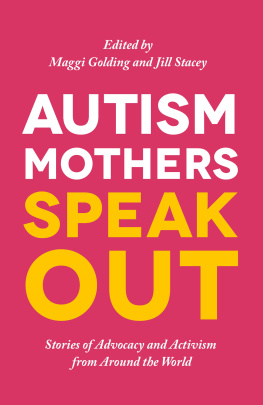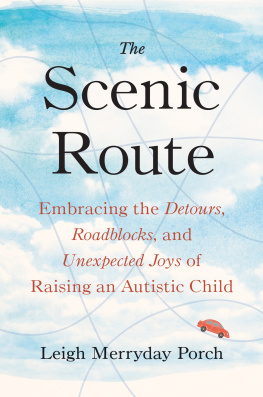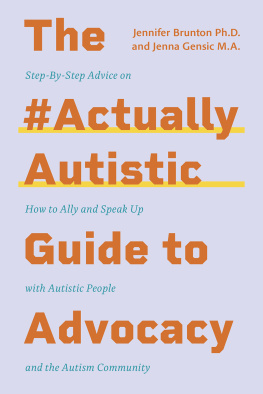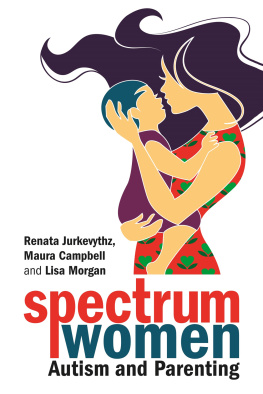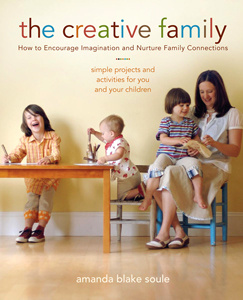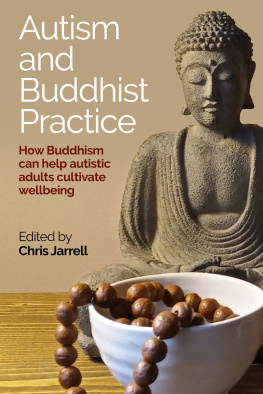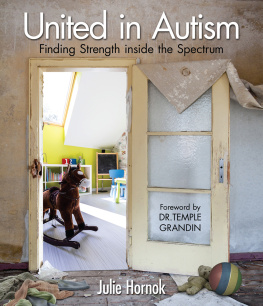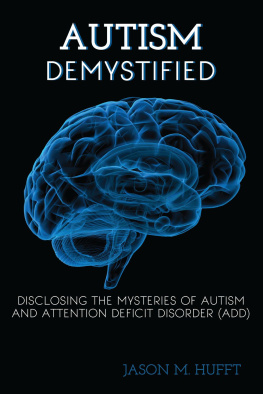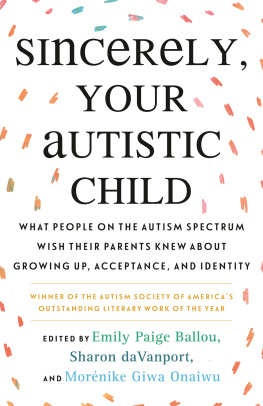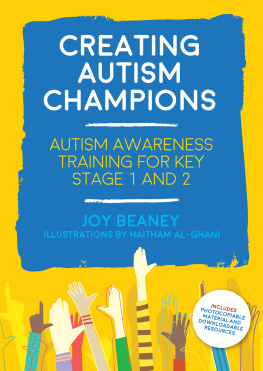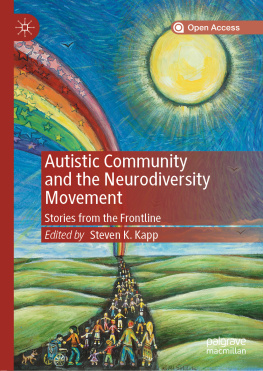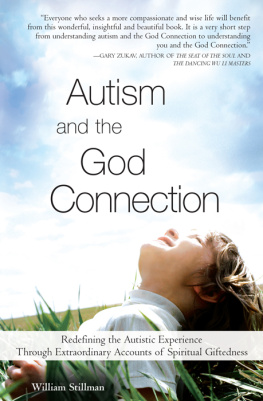
AUTISM MOTHERS
SPEAK OUT
STORIES OF ADVOCACY AND ACTIVISM
FROM AROUND THE WORLD
Edited by Maggi Golding and Jill Stacey

Jessica Kingsley Publishers
London and Philadelphia
CONTENTS
INTRODUCTION
The term refrigerator mothers came into common usage from the 1950s but reflected the views of psychoanalysts from the 1940s who focused on the mothers psychopathology. The perception was that mothers of autistic children lacked warmth and were unable to mother their children. It was thus believed that they caused their childrens autism, and, because of this theory, it was likely that research and the understanding of autism was delayed for at least two decades.
When I met my first child with autism in 1957 I had no idea why this 4-year-old boy was always so distressed. He screamed if people came near him or tried to comfort him. He had no language and did not play or interact with the other children. Paul was one of 36 small children with developmental and learning difficulties who had been transferred from orphanages and institutions after the Second World War to a small residential school, to see if this would be an enabling environment. And so it was for 11 of the 12 children in the class group, but not for Paul. Older members of staff were convinced he needed to be disciplined, but none of the then-suggested approaches worked, and his plight occupied my mind even when I was off duty one and a half days each week.
Two years later, I was appointed to a teaching post at a new psychiatric childrens hospital in High Wick, Hertfordshire, UK. Here, I found many children like Paul who were exhibiting strange behaviours. Some of them attacked those around them or hurt themselves. Most of the patients, as they were called, had no speech, and they did not interact socially. Paul was transferred to High Wick and I was surprised to see that his distress lessened and he started to make progress in my classroom in an environment where there were other children like him.
High Wick was run according to Freudian psychoanalytical principles, and many famous experts such as Anna Freud, Dr Donald Winnicott and others were involved in training and support at the hospital. Initially, the children were labelled as psychotic or schizophrenic, but were later described as being severely emotionally disturbed and/or suffering from early childhood autism. This was seen as being a condition of early childhood which could be cured by psychoanalytical treatment for the mother to help her to be able to mother and bond with her child. The child would be treated in play therapy where Freudian interpretations were made related to the childs behaviour. The implication was always that the autistic child had withdrawn from the real world and could be helped to overcome his autism. No one thought that children with autism would grow up into adults with autism.
In common with other experts in the field at High Wick hospital, the childrens problem behaviours were believed to be due to the family psychopathology and especially to the alleged lack of warmth or parenting abilities of the mothers.
Dr Leo Kanner, an Austrian American psychiatrist best known for describing early infantile autism
By now the term refrigerator mothers had entered into common parlance.
Charismatic concentration camp survivor, Bruno Bettelheim, broadcast this belief across an array of television shows as well as other media. Bettelheim continually described autistic children as products of mothers who were distant, cold and rejecting, depriving their children of the chance to truly bond.
By this time, there was widespread acceptance of this belief by the medical profession and the general public.
In The Empty Fortress , Bettelheim compared children with autism to the plight of prisoners in a concentration camp. Autism was now viewed as a disorder of parenting.
From 1940 through to the 1970s, Bettelheim was the Director of the University of Chicagos Orthogenic School and he stated that the children would benefit from a parentectomy. The psychoanalytical world supported and further articulated this theory. For example, in his book Interpretation of Schizophrenia (1955), well-respected psychiatrist Sylvano Arieti wrote about the motherchild relationship and how an autistic tendency is the sign of a disorder in socialisation. He assumed that this implied a difficulty between a child and his parents.
Frances Tustin spent her professional life upholding this theory. She was adamant that one should note that autism is one of a number of childrens neurological disorders of a psychogenic nature, and that it is caused by the abusive and traumatic treatment of infants. She referred to millions of children who were damaged because of cruel treatment by parents who were too busy to love and care for their babies.
However, by the late 1960s, psychoanalytical theory began to lose its credibility due to several factors.
Bernard Rimland, a research psychologist and parent of a child with autism, was the first person to challenge the psychiatric orthodoxy about the cause of autism. In his 1964 book, Infantile Autism: The Syndrome and Its Implications for a Neural Theory of Behaviour , he questioned the theory of the unloving parentchild relationship and presented a fairly strong argument that autism was a biological and not a psychogenic condition.
In the same year, Eric Schopler, in his doctoral research on the sensory preferences of children with autism, helped to redefine the condition as a developmental disability rather than a psychogenetic one caused by poor parenting.
In 1971, he described how parents were co-therapists and were primary developmental agents for their children. In writing about the project, he explained that the research showed that the parents reacted to the developmental disability rather than caused it.
Many professionals in the field were puzzled that these so-called refrigerator mothers had produced non-autistic siblings. At High Wick hospital, in informal talks with mothers, it seemed as though their psychoanalytical treatment was increasing their feelings of guilt about what they might have done wrong to be such bad parents to their children with autism. In conversations when they came to collect their children from the schoolroom, most of them said that they accepted the theory that they were to blame and several of them said they were appreciative of the opportunity to have the treatment on offer so that they could undo the damage they had done. My main impression after listening to the mothers was that they were unhappy and often distressed, and I wondered what they had done with this particular child to make him/her autistic when they had other perfectly normal sons and daughters. Their commitment to the time and energy given to their treatment was outstanding. It spoke of their devotion to the child with autism. I was confused!
Then, after Bettelheim died in 1990, it was revealed by Richard Pollak, the brother of a person with autism, in his book, The Creation of Dr B, that his life story had been misconstrued. Dr Bettelheim had, in fact, invented his credentials and expertise on autism and had popularised the refrigerator mother theory without adequate proof.
However, for many years after there was anger and mistrust on the part of parents towards professionals and this extended towards all professionals, not just those in the medical field. At an inaugural meeting of parents who eventually founded the National Autistic Society in the UK, I was asked why I was attending as I was not a parent. When I described my work as an educator with children with autism, I was asked to entertain their children in the next room while the meeting took place!
Next page
